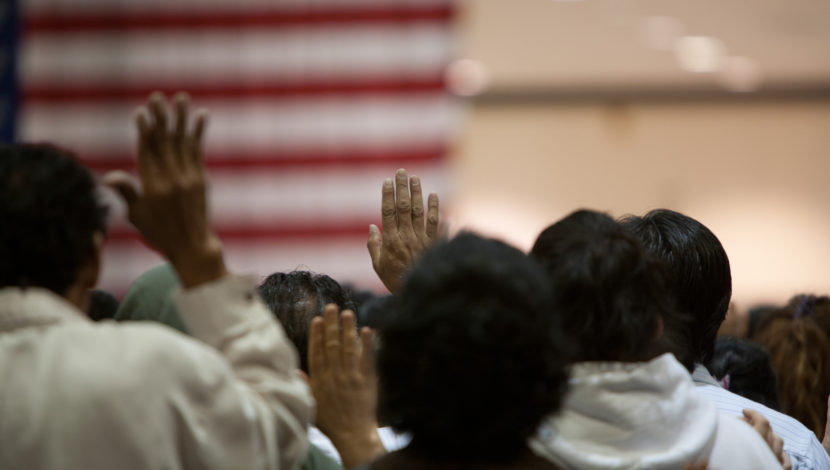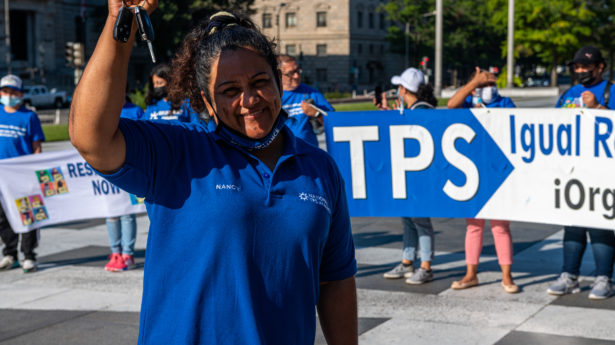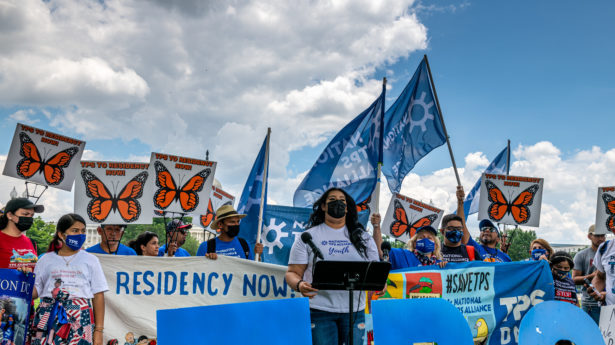The Unitarian Universalist Service Committee advances human rights through grassroots collaborations.
The Fight for Citizenship in Congress Continues… (Part 2)

By on November 16, 2021
In part two of this series, we further discuss the Build Back Better bill, how it can be used to achieve citizenship for millions, and what has to happen for the bill to become law. Read part one here.
What would happen if VP Harris ruled to keep citizenship in the reconciliation bill?
If Vice President Harris were to make this decision, there is a good—though far from certain—chance that citizenship would ultimately be signed into law. Our partners at the UndocuBlack Network, along with three other membership-driven grassroots immigrant rights organizations—have laid out a comprehensive roadmap for how this process would unfold:
First, the House of Representatives needs to include a path to citizenship in the text of the reconciliation bill that they send to the Senate. Then, a simple majority of senators would need to vote down any harmful anti-immigrant amendments proposed on the Senate floor to strip these measures out. (These, however, would be votes on substantive policy, not on the procedural rules of budget reconciliation). Then, Vice President Harris (or her designees) can act on her own authority to keep these citizenship provisions in the text of the bill.
At this stage of the process, some senators would likely raise a “point of order” in an effort to strip out the path to citizenship, arguing that it violates the budget reconciliation rules. In order for this attempt to succeed on appeal, however, a supermajority of 60 senators would need to agree with it. It is highly unlikely that so many votes to eliminate the path to citizenship could be found.
Afterward, a simple majority of senators could finally pass the whole legislative package and send it to the president’s desk. With Biden’s signature, a pathway to citizenship for millions would finally become law.
This strategy does depend, crucially, on 50 senators and the Vice President voting together to strike down all the anti-immigrant amendments and ultimately to approve the final bill. However, only a substantially smaller number—41—would need to support keeping the measure in the text of the bill in order for it to survive the “point of order” appeal. This means that citizenship still has a fighting chance of making it into law.
In order to get there, however, the House needs to commit to include citizenship in the final bill, which they are right now hesitating to do.
What is the House proposing at this point?
According to the most recent negotiations, the majority caucus in the House is currently proposing to include measures that fall far short of a full path to citizenship. Instead of making green cards (the crucial first step on the path to citizenship) available to long-term undocumented people, the House’s proposed language would grant them only a temporary form of “parole.”
This status would allow people to live and work in the United States for a time without fear of deportation and family separation. However, it would expire after a maximum of 10 years, leaving many people in much the same position in which they started.
To be sure, parole would indirectly help a subset of undocumented immigrants achieve a path to citizenship. After all, some undocumented people in the U.S. currently are the immediate relatives of U.S. citizens, and they would qualify for green cards already if it were not for a provision of the law that requires them to be either “admitted” or “paroled” in order to qualify. The parole status would remove this barrier, thereby allowing some currently-undocumented parents, spouses, and other immediate family members of U.S. citizens to finally get lawful permanent status in the United States.
Such a change would clearly be an improvement over the status quo. For this reason, UUSC and our partners the National TPS Alliance support it, if it is truly the only option. (It’s worth noting here that the parliamentarian has not yet weighed in on the parole proposal, so it’s unclear if it would have an easier path than green card provisions.) As Julio Perez of the TPS Alliance put it in a recent statement: “If a so-called parole status is all that can get to President Biden’s desk, then Democrats need to stop playing games with our lives and get it done.”
We also join our partners at the UndocuBlack Network in maintaining that we have not yet reached that stage. Citizenship is still very much a winnable goal within this Congress, for the reasons our partners laid out above. House leadership must remain steadfast in including these measures in their version of the bill, and a simple majority of senators likewise needs to hold the line on voting down any anti-immigrant amendments and ultimately supporting passage of the final bill.
The odds they will do so are not 100%. But they are also far from zero. And the lives and futures of millions of people counting on a path to citizenship from this Congress are worth fighting for.
That is why UUSC’s message to Congressional leaders is unchanged: We demand and expect a path to citizenship through reconciliation in this Congress. Join us in calling on your senators to hold the line and vote for a path to citizenship in the Build Back Better bill.
Photo Credit: iStock — P_Wei

